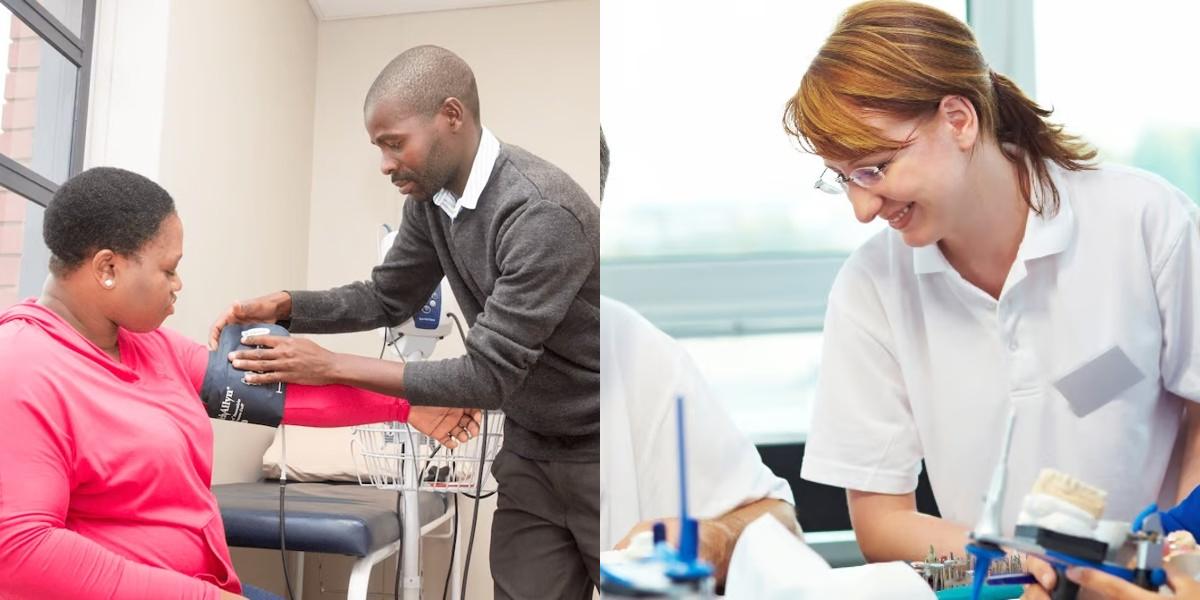Medical Assistant vs Psychiatric Technician

Key Points:
- Medical Assistants perform basic clinical tasks, while Psychiatric Technicians focus on mental health care and counseling.
- Medical Assistants typically earn a lower median salary compared to Psychiatric Technicians.
- Medical Assistant training is generally less expensive and shorter than Psychiatric Technician training.
When it comes to a career in the healthcare field, there are many paths to choose from. Two popular options are becoming a medical assistant or a psychiatric technician. While both of these professions involve working with patients and providing care, there are some key differences between the two. In this blog post, we will explore what it means to be a medical assistant and a psychiatric technician, the differences between the two roles, and the education and training required for each. We will also discuss the career outlook and salary potential for both professions.
Medical Assistant Education and Training:
- Most medical assistants complete a postsecondary education program that lasts 1-2 years and leads to a certificate or diploma. These programs are offered by community colleges, vocational schools, and technical schools.
- Some medical assistants may also choose to pursue an associate degree in medical assisting, which typically takes 2 years to complete.
- In addition to formal education, medical assistants often receive on-the-job training from their employer.
Psychiatric Technician Education and Training:
- Psychiatric technicians typically need to complete a postsecondary education program in psychiatric technology. These programs are offered by community colleges and vocational schools and typically take 1-2 years to complete.
- Some states may require psychiatric technicians to be licensed or certified. Licensure or certification requirements may include completing an approved education program, passing an exam, and fulfilling continuing education requirements.
Medical Assistant vs Psychiatric Technician: Career Outlook and Salary
Both medical assistants and psychiatric technicians can expect to see job growth in the coming years. However, the demand for these professions may vary depending on factors such as location and industry.
Medical Assistant Career Outlook and Salary:
- According to the Bureau of Labor Statistics, employment of medical assistants is projected to grow 19 percent from 2019 to 2029, much faster than the average for all occupations.
- The median annual wage for medical assistants was $35,850 in May 2020, with the lowest 10 percent earning less than $26,930 and the highest 10 percent earning more than $51,850.
Psychiatric Technician Career Outlook and Salary:
- According to the Bureau of Labor Statistics, employment of psychiatric technicians is projected to grow 6 percent from 2019 to 2029, faster than the average for all occupations.
- The median annual wage for psychiatric technicians was $33,220 in May 2020, with the lowest 10 percent earning less than $24,960 and the highest 10 percent earning more than $61,610.
Final Thoughts
Choosing a career in the healthcare field is a rewarding decision. Both medical assistants and psychiatric technicians play important roles in providing care to patients and contributing to their overall well-being. While the two professions have some similarities, they also have distinct differences in terms of job responsibilities, patient population, and scope of practice. It is important for individuals considering these career paths to carefully consider their interests, skills, and career goals in order to make an informed decision.
Dreambound extends its programs to diverse locations. Delve deeper into information about these two vocations by visiting:

Sunshine is a member of the School Growth team at Dreambound, where she assists students and schools with their billing and onboarding needs. She is a licensed mechanical engineer. Outside of work, she enjoys road trips with her family, discovering cozy cafes, and exploring her love for art.





